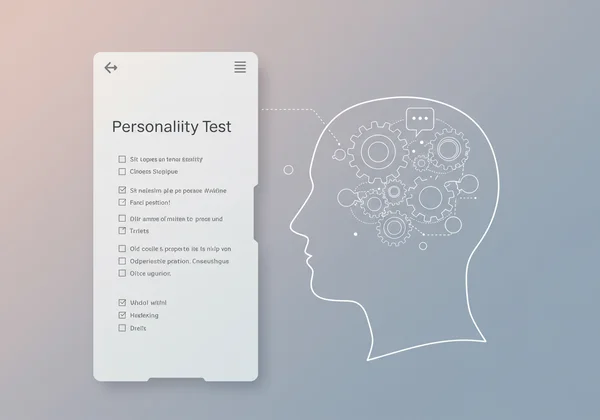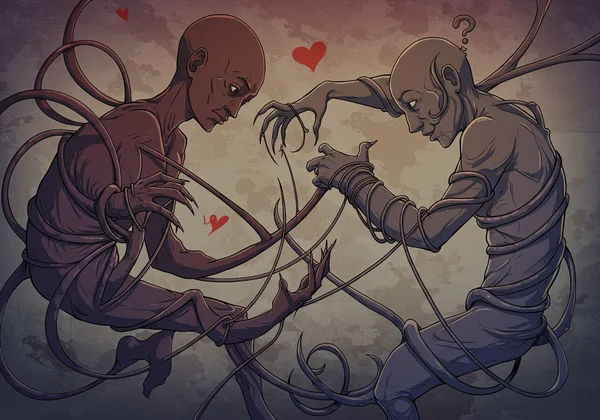The Dark Triad Test in Relationships: Understanding Love, Family, & Friendship
August 10, 2025 | By Julian Vance
The world of human connection is complex, a delicate dance of emotion, trust, and vulnerability. But what happens when this dance is influenced by the enigmatic personality traits of the Dark Triad? The concept of dark triad relationships can be both fascinating and unsettling, leaving many to wonder: How do dark triad people act in their closest bonds? This guide will explore how Machiavellianism, Narcissism, and Psychopathy shape romantic partnerships, family dynamics, and friendships, offering insights to foster awareness and healthier interactions.
Gaining clarity about these traits is a crucial first step. Whether you recognize these patterns in yourself or others, this knowledge empowers significant personal growth. To begin this journey, a confidential dark triad test can provide a detailed look at your own profile. Take the free test on our homepage to start.

Understanding Dark Triad Traits in Personal Connections
Before diving into specific relationship types, it's crucial to grasp what constitutes the Dark Triad. These are not clinical diagnoses but rather a constellation of subclinical personality traits that everyone possesses to varying degrees. Understanding them is key to recognizing their influence on interpersonal dynamics.
A Brief Overview of the Dark Triad Traits
The Dark Triad, a term coined by psychologists Delroy Paulhus and Kevin Williams, consists of three distinct yet overlapping traits:
- Machiavellianism: Characterized by a manipulative, cynical, and strategic approach to life. Individuals high in this trait often view others as means to an end and are skilled at social maneuvering to achieve their goals.
- Narcissism: Defined by an inflated sense of self-importance, a deep need for excessive attention and admiration, and a lack of empathy for others. They often project an image of superiority and entitlement.
- Psychopathy (Subclinical): Marked by high impulsivity, thrill-seeking behavior, and a profound lack of empathy and remorse. They may be superficially charming but struggle to form genuine emotional bonds.
Why These Traits Impact Interpersonal Dynamics
The core of these dark triad personality effects lies in their impact on empathy, trust, and reciprocity—the cornerstones of any healthy relationship. A tendency toward manipulation (Machiavellianism), a focus on the self (Narcissism), and an inability to feel for others (Psychopathy) can create imbalanced, confusing, and often painful dynamics for those involved. Awareness of these underpinnings is the first step to navigating them effectively. For many, taking a dark triad test provides the objective data needed to start this process.
Romantic Dynamics: Dark Triad & Love
The Dark Triad's influence is perhaps most potent and perplexing within romantic relationships. The journey of dark triad love often begins with intense allure but can evolve into a landscape of emotional challenges, making it crucial for partners to understand the terrain.
The Initial Allure and Hidden Challenges of Dating a Dark Triad Individual
Individuals with prominent Dark Triad traits can be exceptionally charming, confident, and captivating at first. Their charisma (often from narcissistic traits) and assertiveness can be highly attractive. This initial phase can feel exciting and passionate, drawing partners in quickly.
However, these dark triad relationship patterns often shift over time. The initial charm may give way to control, jealousy, and emotional manipulation. A partner may notice that their needs are consistently overlooked in favor of the other's, or that conversations are masterfully twisted, leaving them feeling confused and emotionally exhausted. For a clearer picture of these dynamics, you can discover your profile on our website.

Can a Dark Triad Individual Truly Love? Exploring Emotional Depth
A common question is, "Can a dark triad fall in love?" The answer is nuanced. While they can form attachments and express affection, their experience of love may differ significantly from the norm. Love might be viewed more transactionally—as a source of validation, status, or excitement—rather than a deep, empathetic connection.
For individuals high in psychopathy, the capacity for genuine emotional bonding is limited. For those high in narcissism, "love" may be contingent on the partner's ability to admire and serve them. Machiavellian individuals might see relationships as strategic alliances. While they may feel a version of love, it is often filtered through the lens of their dominant traits.
Dark Triad in Friendships and Social Circles
Friendships are built on mutual support, trust, and reciprocity. However, when Dark Triad traits enter the picture, these foundations can become unstable, transforming a platonic bond into a source of stress and uncertainty.
How Dark Triad Traits Manifest in Platonic Bonds
In friendships, these traits can manifest subtly. A narcissistic friend might dominate every conversation, subtly belittling others to maintain their superior status. A Machiavellian friend could use gossip strategically or create rivalries within a social group for personal gain. A friend with psychopathic traits might be the life of the party but engage in risky behaviors without regard for consequences, often borrowing money or support without ever repaying it. These dark triad friends behavior can slowly erode the quality of the friendship.
Navigating Reciprocity and Trust with Dark Triad Friends
A friendship with a dark triad individual often feels one-sided. You might find you are always the one giving emotional support, celebrating their wins, and offering help, with little in return. Trust can be difficult to establish, as you may feel they are not genuinely invested in your well-being. Recognizing this imbalance is the first step toward protecting your own emotional energy.
Family Dynamics and the Dark Triad
Family relationships are often our most enduring and complex connections. When a family member exhibits strong Dark Triad traits, the impact can be profound and lifelong, affecting the entire family system.
Understanding Dark Triad Traits in Parents or Children
Dark triad parenting can create a challenging environment for a child's development. A narcissistic parent may see their child as an an extension of themselves, demanding perfection to reflect well on them. A Machiavellian parent might use guilt and manipulation to control their children's choices. Conversely, a child with these traits can create significant strain, often challenging authority and manipulating siblings.

Managing Expectations and Boundaries with Family Members
Dealing with family with dark triad traits requires robust boundaries and realistic expectations. You cannot change their core personality, but you can change how you interact with them. This may involve limiting contact, refusing to engage in manipulative conversations, and clearly stating what behavior you will and will not accept. It's about protecting your peace while navigating an obligatory connection.
Strategies for Healthier Interactions & Self-Protection
Whether in love, friendship, or family, interacting with someone high in Dark Triad traits requires a proactive approach centered on self-awareness and self-preservation. Knowledge is your best defense. Start by taking our confidential free dark triad test to understand these traits better.
Setting and Enforcing Clear Boundaries
This is the most critical strategy for dealing with dark triad behaviors. Boundaries are not about controlling the other person; they are about controlling what you will tolerate. Be clear, firm, and consistent. For example, state, "I will not continue this conversation if you are yelling," and then follow through by leaving the room if the behavior persists.

Prioritizing Your Emotional Well-being and Self-Care
Engaging with individuals high in these traits is emotionally draining. It is essential to prioritize self-care in dark triad relationships. This involves actively investing in self-care, such as pursuing fulfilling hobbies, leaning on a supportive network of friends who validate your feelings, or considering therapy to process your experiences. Your well-being must be your top priority.
Empowering Your Relationships Through Greater Awareness
Understanding the Dark Triad is not about labeling people but about recognizing patterns of behavior to navigate your relationships more effectively. It empowers you to set boundaries, protect your emotional health, and make informed choices about who you allow in your life. This knowledge fosters profound personal growth and self-awareness. Taking a dark triad test is a proactive step towards this empowerment.

Are you ready to uncover your own profile and gain deeper, personalized insights? Discover your profile by taking our scientifically-backed test. Your journey to greater understanding starts now.
Frequently Asked Questions About Dark Triad & Relationships
Can a Dark Triad Individual Feel or Express Love?
While individuals with Dark Triad traits can form relationships and show affection, their experience of love is often different. It may be more focused on what the relationship provides them (admiration, control, excitement) rather than a deep, empathetic connection. Genuine emotional vulnerability and reciprocity can be significant challenges.
How Do Dark Triad Traits Typically Manifest in Relationships?
Common manifestations include manipulation, a lack of empathy, a constant need for admiration, and a tendency to be controlling or exploitative. In relationships, this can lead to emotional turmoil, confusion, and a feeling of being consistently devalued or used. Understanding your own traits through a dark triad personality test can bring clarity.
What are the Most Attractive Traits Associated with the Dark Triad in Relationships?
Initially, traits like confidence, charisma, assertiveness, and a charming demeanor are highly attractive. These qualities, often linked to narcissism, can create an exciting and intense initial connection. However, these same traits can later contribute to the challenges within the relationship.
How Can Understanding Dark Triad Traits Help My Relationships?
Understanding these traits is empowering. It helps you recognize unhealthy patterns, set firm boundaries, and protect your emotional well-being. For self-explorers, taking a dark triad test can reveal personal tendencies, offering a pathway to self-improvement and healthier interactions with others.
Disclaimer: This article is for informational and educational purposes only. It is not a substitute for professional psychological advice, diagnosis, or treatment. The test offered on our site is a self-exploration tool, not a clinical diagnostic instrument.